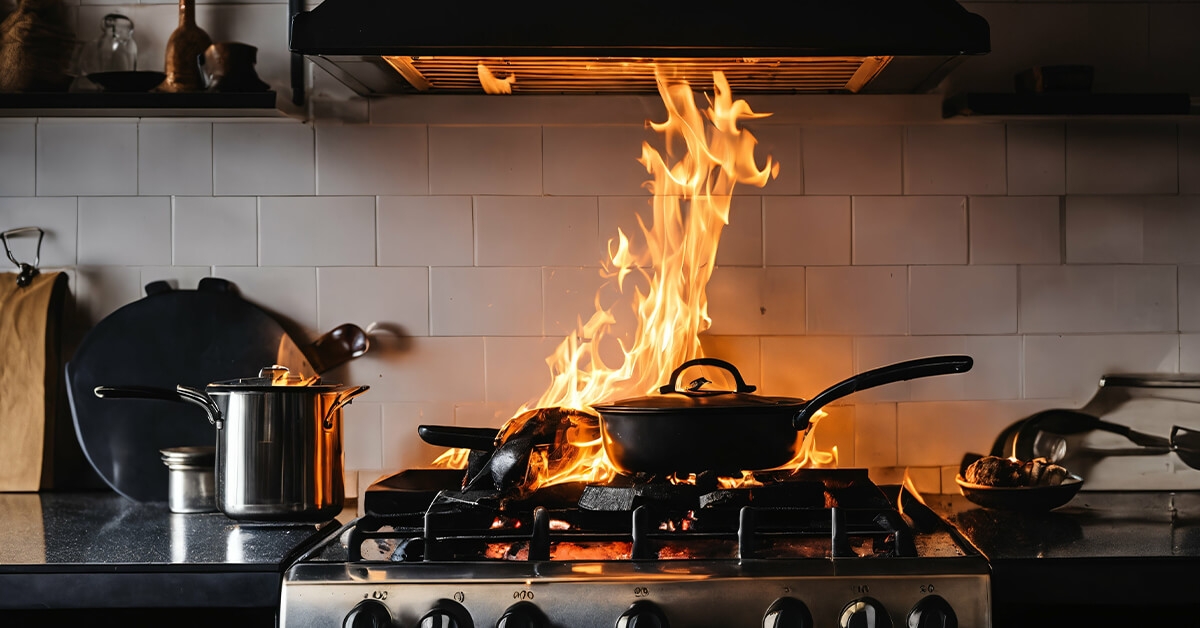
Summer Heat & Fire Safety: Protecting Your Michigan Home This July
When temperatures rise and humidity drops, Michigan homes and businesses face a greater risk of fire. July, in particular, brings a unique set of seasonal hazards—from dry brush and flammable landscaping to overloaded electrical systems and carelessly used fireworks.
While summer is a time to enjoy barbecues, vacations, and celebrations, taking proactive steps to protect your home or workplace from potential fire emergencies is critical.
Why Fire Risk Increases in Summer
July is one of Michigan's hottest and driest months, especially in inland and rural areas where rain can be scarce and vegetation dries out quickly. That combination creates ideal conditions for accidental fires, especially with outdoor activities like grilling or setting off fireworks.
Some of the most common causes of summer fires in Michigan include:
- Improper disposal of cigarettes or matches outdoors
- Malfunctioning air conditioning units or overloaded electrical circuits
- Grills or fire pits placed too close to siding or decks
- Improperly stored gas cans or propane tanks
- Neglected brush and dry vegetation surrounding buildings
- Faulty or missing smoke detectors
The good news is that most of these risks can be managed with simple precautions and seasonal maintenance.
Essential Fire Safety Tips for July
Inspect & Maintain Smoke & CO Detectors
Smoke and carbon monoxide detectors are your first line of defense in a fire emergency. Test every unit monthly, replace batteries at least once a year, and make sure each device is under 10 years old. Pay special attention to detectors near kitchens, bedrooms, and utility areas where fires are most likely to start.
In commercial buildings, ensure systems are interconnected and up to code to alert occupants throughout the property. A functional smoke alarm reduces your risk of fire-related death by more than 50%—don't wait until it's too late to find out yours isn't working.
Clear Dry Brush & Flammable Debris
Michigan summers often dry out surrounding vegetation, making brush, leaves, and debris a fire hazard. Keep a 30-foot safety perimeter around your home or business by regularly clearing away weeds, branches, and anything flammable. Trim back trees, remove leaf piles, and maintain a healthy lawn to slow fire spread.
On rural or wooded properties, consider establishing defensible space zones, particularly near outbuildings, propane tanks, or fencing. These steps not only reduce ignition risk but also give firefighters a better chance of protecting your property if disaster strikes.
Keep a Restoration Company Phone Number Handy as a Precaution
Even with the best prevention efforts, fire damage can still occur, and when it does, time matters. That's why it's smart to keep the contact information for a trusted restoration company saved in your phone and posted somewhere visible in your home. Having a reliable team on standby can make all the difference in minimizing damage and starting the recovery process quickly.
MJ White is a professional restoration company you can count on for fast response and expert service. Whether you're dealing with smoke, soot, or structural damage, MJ White offers comprehensive fire restoration solutions designed to help homeowners regain control after a crisis. Keep their number on file now so you're not scrambling later.
Keep Grills & Fire Pits at a Safe Distance
Outdoor cooking is a summer staple, but grills and fire pits can quickly spark structure fires if placed too close to buildings. Always position them at least 10 feet from siding, railings, and overhanging branches. Avoid using grills on covered porches or decks, and make sure surfaces are level and nonflammable.
Keep a fire extinguisher, hose, or bucket of sand nearby just in case. When finished, let coals cool completely before disposal, and store propane tanks safely outside and away from heat sources.
Have Electrical Systems Checked
Air conditioning units, fans, and increased device usage in summer can overload outdated wiring or panels. If you notice tripped breakers, dimming lights, or hot outlets, schedule a professional inspection immediately. Electrical fires often start behind walls or in attics, making early detection difficult.
Business owners should also conduct electrical load assessments and system upgrades before the summer peak to avoid service interruptions and fire risk. Preventive maintenance now can stop a dangerous—and expensive—problem later.
Limit Extension Cord Use & Avoid Daisy-Chaining
Extension cords are not designed for long-term or high-load use. Stick to heavy-duty outdoor-rated cords when needed, and never connect multiple cords together (a practice known as daisy-chaining).
This can cause overheating and sparks, especially when powering large appliances or multiple outdoor devices. Instead, install permanent outlets in high-use areas, and unplug cords when not in use. Pay attention to heat around plugs—if a cord feels warm to the touch, it may already be overloaded and at risk of failure.
A Special Word on Fireworks in Michigan
Fireworks are synonymous with summer celebrations, but they also bring a significant fire hazard. According to the National Fire Protection Association (NFPA), fireworks sparked 31,302 fires in the U.S. in 2022, including 3,504 structure fires, 887 vehicle fires, and 26,492 outside or other fires. On average, that's more than 19,000 fireworks-related fires every year.
These incidents often coincide with Independence Day weekend, when drought conditions and dry vegetation abound. The NFPA report highlights how quickly a single stray spark can ignite grass, decks, or even rooftops. Beyond property damage, these fires cause injuries, displace families, and cost millions in repairs and emergency response.
Here's how to protect your pockets—and your property:
- Never light consumer fireworks on or near combustible material—that includes dry grass, wood piles, siding, or roofing.
- Designate a clear launch area of at least 25--30 feet from structures and vegetation.
- Have water—or better yet, a hose—handy to extinguish flare-ups immediately.
- Fully soak spent fireworks before disposal, and avoid tossing warm debris into trash bins.
- A single spark can travel farther than you think, so don't let celebration turn into catastrophe.
Be Ready for Heat-Related Emergencies
Fire isn't the only threat during Michigan's summer peak. Prolonged heat waves can create emergencies that strain HVAC systems, affect electrical wiring, and increase the risk of dehydration or medical distress.
Prepare with these extra steps:
- Ensure attic and crawlspace ventilation is working properly
- Store flammable materials (e.g., gasoline, propane, chemicals) in cool, shaded areas
- Set up emergency contact plans and cooling centers for vulnerable family members or tenants
- Keep fire extinguishers accessible and fully charged in kitchens, garages, and outdoor areas
- A few preventive measures now can make the difference in a crisis later.
Choose a Trusted Team for Fire Damage Restoration
Fire damage leaves behind more than visible destruction—it affects your air quality, structural integrity, and peace of mind. Smoke and soot can linger in hidden places, and secondary damage from water or heat can worsen over time without proper cleanup.
That's why MJ White provides comprehensive fire damage restoration services throughout Michigan. Our trained technicians assess the scene, remove hazardous materials, and restore your property using advanced tools and proven methods. With over four decades of experience, we act fast to contain damage and begin the recovery process.
Protect Your Home & Your Future—Call MJ White Today
When summer fire damage threatens your Michigan home or business, don't wait. MJ White is ready to respond 24/7 with professional support, skilled restoration, and true care for your property.
Call us at 888-992-4404 or reach out online to schedule an assessment and take the first step toward recovery.


